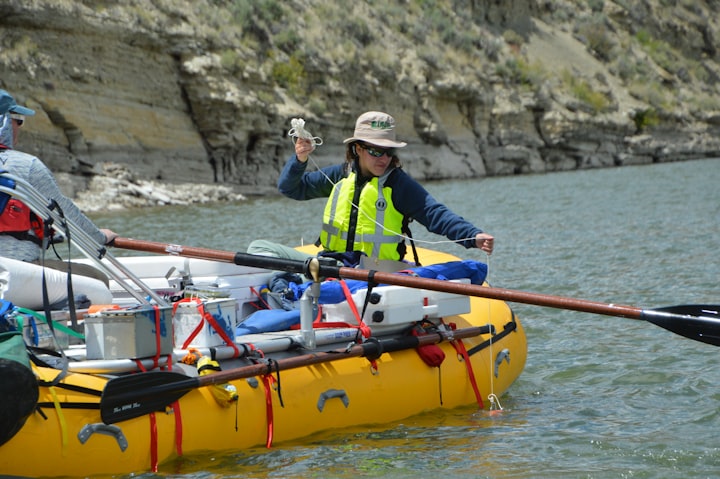How to Protect Yourself from Air Pollution
Air pollution is a growing concern in today's world

Introduction
Air pollution is a growing concern in today's world, and its effects on health and the environment cannot be ignored. Exposure to air pollution can lead to a range of health problems, including respiratory diseases, heart disease, and even cancer. However, there are several ways to protect yourself from air pollution, which we will discuss in this article.
Stay Informed
The first step to protecting yourself from air pollution is to stay informed about the quality of air in your area. You can check the air quality index (AQI) in your area by visiting websites such as AirNow.gov or the World Air Quality Index. If the AQI is high, it is recommended to limit your time outdoors or take additional precautions to protect yourself.
Use an Air Purifier
An air purifier is a device that can help remove pollutants and particles from the air in your home. These devices can be especially useful for individuals with respiratory problems or those living in areas with high levels of pollution. Look for air purifiers with high-efficiency particulate air (HEPA) filters, which are designed to remove even small particles from the air.
Wear a Mask
Wearing a mask can help protect your lungs from harmful pollutants in the air. N95 respirators are recommended for protection against particulate matter, such as dust, smoke, and airborne viruses. These masks are designed to filter out at least 95% of airborne particles.
Use Natural Air Filters
Plants can be natural air filters, as they absorb carbon dioxide and release oxygen. Some plants, such as aloe vera, spider plant, and snake plant, are especially effective at removing harmful pollutants from the air, such as formaldehyde, benzene, and xylene. Consider placing these plants in your home or office to help purify the air.
Keep Your Home Clean
Regular cleaning can help reduce indoor air pollution. Dust, pet dander, and other pollutants can accumulate in carpets, curtains, and furniture. Vacuuming and dusting regularly can help remove these pollutants and improve indoor air quality. Additionally, using natural cleaning products, such as vinegar and baking soda, can help avoid the release of harmful chemicals into the air.
Limit Your Exposure to Pollution
If you live in an area with high levels of pollution, it's important to limit your exposure. Try to avoid exercising or spending time outdoors during peak pollution times, such as rush hour. Additionally, consider using public transportation, carpooling, or biking to reduce your own contribution to air pollution.
Support Clean Energy
Supporting clean energy can help reduce air pollution. Renewable energy sources, such as wind and solar power, do not produce harmful pollutants and are a cleaner alternative to fossil fuels. Consider using renewable energy in your home, such as installing solar panels or purchasing electricity from renewable sources.
Advocate for Clean Air
Advocating for clean air can help raise awareness and bring about policy changes to reduce air pollution. Contact your local representatives and urge them to support legislation that promotes clean air, such as stricter emissions standards for factories and vehicles.
Air pollution is a serious issue that affects everyone, but there are several ways to protect yourself and reduce your contribution to the problem. Staying informed, using air purifiers and masks, using natural air filters, keeping your home clean, limiting your exposure to pollution, supporting clean energy, and advocating for clean air are all effective ways to protect yourself from air pollution. By taking action, we can all work together to create a cleaner, healthier environment for ourselves and future generations.
Monitor Indoor Air Quality
While it's important to be aware of outdoor air quality, indoor air quality can also be a concern, especially if you spend a lot of time inside. Factors such as poor ventilation, dust, and mold can contribute to poor indoor air quality. You can monitor indoor air quality with an indoor air quality monitor, which can measure levels of pollutants such as carbon monoxide, volatile organic compounds (VOCs), and particulate matter.
Avoid Smoking and Secondhand Smoke
Cigarette smoke is a significant source of air pollution, containing over 7,000 chemicals, many of which are toxic. Smoking and exposure to secondhand smoke have been linked to a range of health problems, including lung cancer, heart disease, and respiratory problems. Avoid smoking and secondhand smoke to protect yourself from these harmful pollutants.
Use Eco-Friendly Products
Many household cleaning and personal care products contain harmful chemicals that can contribute to indoor air pollution. Switching to eco-friendly products can help reduce your exposure to these chemicals and improve indoor air quality. Look for products that are free from synthetic fragrances, phthalates, and other harmful chemicals.
Install Carbon Monoxide Detectors
Carbon monoxide (CO) is a colorless, odorless gas that can be lethal in high concentrations. CO can be produced by gas heaters, stoves, and other fuel-burning appliances. Installing a carbon monoxide detector in your home can help alert you to dangerous levels of this gas.
Use Proper Ventilation
Proper ventilation is essential for maintaining good indoor air quality. Opening windows and using exhaust fans in bathrooms and kitchens can help remove pollutants from the air. Consider installing a heat recovery ventilator, which can help bring fresh air into your home while recovering heat from the air that is being exhausted.
Reduce Your Carbon Footprint
Reducing your carbon footprint can help reduce air pollution on a global scale. Simple actions such as driving less, using energy-efficient appliances, and reducing food waste can all help to reduce greenhouse gas emissions and improve air quality.
Stay Prepared
Finally, it's important to be prepared for air pollution events, such as wildfires or industrial accidents. Make sure you have an emergency kit with necessary supplies, such as N95 masks, and be aware of evacuation routes and emergency shelters in your area.
Conclusion
In conclusion, protecting yourself from air pollution requires a multifaceted approach. By staying informed, using air purifiers and masks, using natural air filters, keeping your home clean, limiting your exposure to pollution, supporting clean energy, advocating for clean air, monitoring indoor air quality, avoiding smoking and secondhand smoke, using eco-friendly products, installing carbon monoxide detectors, using proper ventilation, reducing your carbon footprint, and staying prepared for air pollution events, you can help protect your health and the health of the planet.
About the Creator
HSE Insider
Join the HSE community and take your safety knowledge to the next level with “HSE Insider”
Follow us on social media and be sure to share with your network. Together, we can make the world a safer place.
Support HSE Insider today!






Comments
There are no comments for this story
Be the first to respond and start the conversation.